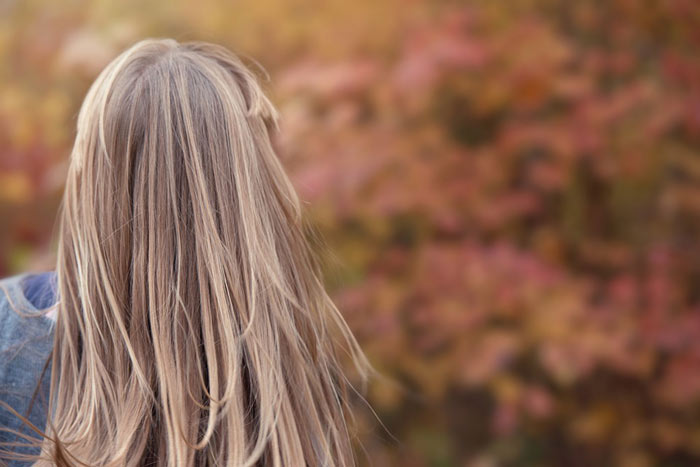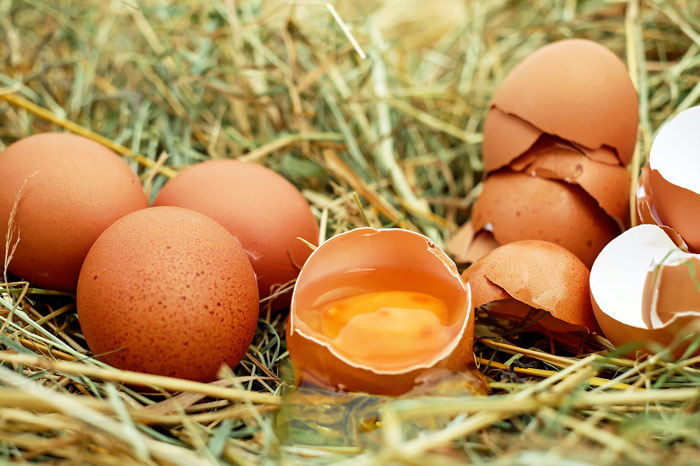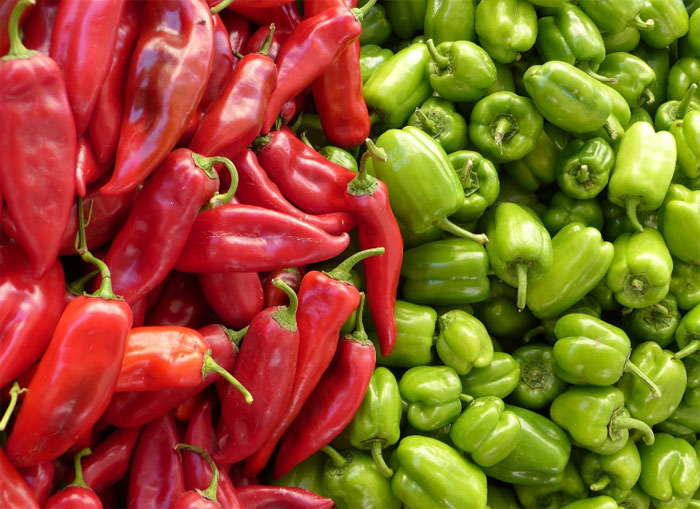A healthy diet goes a long way toward promoting hair growth and health. For strong, lustrous locks there are certain must-have nutrients on which you should not skimp. A vegetarian diet can be slightly more challenging in terms of easily accessing the vitamins, minerals, and macronutrients you need for top hair health, because some of them are predominantly found in meat and animal products.

However, with a little forethought, you can ensure that you’re getting key nutrients for hair in your daily diet. Below, we’ll look at 7 of the best vegetarian foods to eat for hair growth and health.
Spinach
This leafy green packs a ton of iron and biotin, both of which are critical for great hair. Studies have found that iron deficiency is associated with hair loss. Biotin deficiency, while rare, can also manifest in hair loss. Biotin (or vitamin B7) is so crucial to hair health that treatment with the vitamin has been shown to mitigate a condition called “uncombable hair syndrome”, wherein the structure of the hair makes it so that it’s slow to grow and difficult to comb.
Spinach is also an excellent source of vitamin A, which aids in the production of sebum that lubricates the scalp and promotes healthy hair. Hair loss is one of the potential effects of vitamin A deficiency, but getting too much of the nutrient in the form of supplements can cause toxicity that also contributes to hair loss. So, the best way to obtain your vitamin A is from the food you eat.
Walnuts
 These buttery nuts contain a ton of Omega-3 fatty acids, which are essential anti-inflammatory substances that help with hair growth and health. They’re also a good source of protein (the building block of hair) as well as vitamin E, which has been shown to increase and improve hair growth.
These buttery nuts contain a ton of Omega-3 fatty acids, which are essential anti-inflammatory substances that help with hair growth and health. They’re also a good source of protein (the building block of hair) as well as vitamin E, which has been shown to increase and improve hair growth.
Although walnuts do pack a lot of fat and calories into even the smallest handful, that good fat is also what makes them satiating, so that you’re not tempted to overindulge in them.
Chickpeas (garbanzo beans)
These little legumes are a great staple of a vegetarian diet for hair growth and health for a couple of reasons. First, they pack a lot of protein (over 15 grams per cup). They are also rich in iron (over 25% of one’s daily recommended intake), as well as magnesium and zinc.
Chickpeas are a key ingredient in many South Asian, Middle Eastern, and African foods, from chana masala to hummus to tagine, and can also go a long way in pepping up salads. You can even sprinkle them with spices and bake them for a crunchy snack.
Soybeans, tofu, tempeh
Soy is an excellent source of protein for vegetarians. Unlike many other plant-based proteins, soy actually contains all 9 of the amino acids human bodies need, making it a complete protein. A 100 gram serving of cooked soybeans (edamame) contains close to 1/3 of one’s recommended daily intake of iron, and there’s evidence that the iron in soy has positive absorption rates in women with a low level deficiency in the mineral.
There are many delicious options for incorporating soy into your diet, from eating the nutty beans straight out of their pods as an appetizer, tossing them into salads, or opting for slightly more processed options like tofu and tempeh. A great thing about tempeh is that it’s a fermented food and thus contains probiotics, which may contribute to healthier, shinier hair.
Eggs
 If you aren’t vegan, consider making eggs one of your staples. They are among the best things you can eat for your hair. They’re quite high in vitamin B12, a deficiency in which has been linked to hair loss. They are also high in Omega-3 fatty acids, and contain a great deal of biotin. Plus, the yolks are rich in vitamin D, low levels of which have been associated with hair loss and sluggish hair growth.
If you aren’t vegan, consider making eggs one of your staples. They are among the best things you can eat for your hair. They’re quite high in vitamin B12, a deficiency in which has been linked to hair loss. They are also high in Omega-3 fatty acids, and contain a great deal of biotin. Plus, the yolks are rich in vitamin D, low levels of which have been associated with hair loss and sluggish hair growth.
Milk
This is another great source of a host of important hair growth nutrients for folks who follow a vegetarian, but not a vegan, diet. Vitamin B12, for instance, which only occurs naturally in meat and animal products (though certain foods are fortified with it), is abundant in milk. Milk is also high in calcium, which plays a role in hair follicle development, and the lack of which can cause temporary hair loss. In addition, although vitamin D is not naturally occuring in milk, many of the milk varieties available in stores are fortified with the nutrient, as it greatly aids in calcium absorption.
Flaxseeds
A serving of flaxseeds contains about seven times the recommended daily ALA (alpha-linolenic acid), one of the three key Omega-3 fatty acids (and the only one prevalent in plant-based foods). The tiny seeds are also rich in B vitamins and are easy to add to smoothies, salads, and even use as a substitute for eggs in certain recipes.
One thing to be aware of is that our bodies can’t digest whole flaxseeds (they just pass right through us) and therefore do not extract the nutrients without first grinding the seeds. For best results and maximum freshness, it’s best to buy the whole seeds and grind them at home just before using them (much like coffee beans). But, if you do buy ground flaxseed, store the package in the refrigerator instead of the cupboard to keep it fresher, better-tasting, and help it retain nutrients for longer.
Red peppers
 As a great source of vitamin C, red peppers are among the best foods to eat if you want to boost your hair’s health. Not only is vitamin C a powerful antioxidant with numerous disease-fighting and immune-boosting properties, it also impacts hair shaft development. In addition, red peppers are an solid source of beta-carotene, a precursor to vitamin A.
As a great source of vitamin C, red peppers are among the best foods to eat if you want to boost your hair’s health. Not only is vitamin C a powerful antioxidant with numerous disease-fighting and immune-boosting properties, it also impacts hair shaft development. In addition, red peppers are an solid source of beta-carotene, a precursor to vitamin A.
Eat red peppers raw in salads, with dips, roasted, or however you prefer. Just remember to include them!










